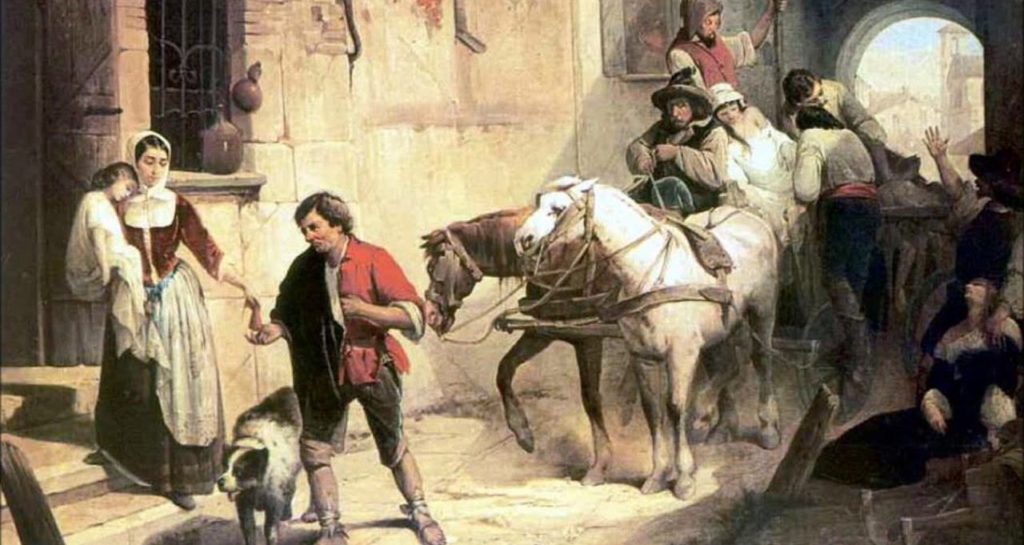“The Betrothed”
The revelation of Humanity during the plague
“Historia Magistrae vitae” (“History is life’s teacher”).
These are the words used by one of the most famous Latin historians, Cicero, to define History and stating its protagonists are human beings given that they are the ones who ‘write’ it. He brings a further insight to this, which is fundamental: revealing people’s humanity, people who lived through different times and places. During this time, in which the world’s population is afflicted by Covid-19, a somber page of the history of humanity is being written, perhaps it is a page many wish to forget given the high number of victims as well as the crash of the global economy.
Nevertheless, it is even during this time that humanity in people reveals itself: doctors and nurses can witness it, as they’re working on the front lines to save as many as they can. It’s not the first time an epidemic causes thousands of victims: in fact, many texts have been written picturing in detail how diseases spread in the past and what consequences they brought.
However, a lifeless textbook doesn’t bring out humans actual behavior in its deepest core, which goes beyond any political and economic changes. Manzoni was one of the writers who depicted the humanity hidden behind History as it can been seen in his book ‘The Betrothed’.
Within the novel, the writer carries out a full description of life during the plague which had spread in Northern Italy by the end of 1629 and 1630. In this case, the spreading of the epidemic came in hand with a loss of common sense and humanity coming from a great number of citizens. Every person perceived others as his or her enemies as they could potentially carry the disease. It even got to the point where “human charity’s boundaries” were broken, in other words it was the deteriorating of fundamental and everyday relationships, for example between husbands and wives or parents and children.
The culmination of such inhumanity can be seen in the monatti: they were prisoners charged to gather up dead bodies from streets and houses and to bury them in mass graves, they however took advantage of this by raiding the city of Milan and going against the law.
In such a dramatic situation, Manzoni reveals little glimpses of humanity, an example of this is shown by the capuchin friars operating in the lazaret. They acted for a greater good, being encouraged by cardinal Federigo Borromeo with these words:
“find the will to abandon this mortal life, or this family, face the plague with love as you would for a prize or for a life, whenever a soul could be won over by Christ.”
The friars’ charity in assisting the population had a great impact on History since they managed to reorganize the lazaret helping doctors and saving thousands of lives. Manzoni also shows how there is still a glimpse of humanity amongst ordinary people in presenting the character of Renzo. While the young man wanders around the city of Milan (looking for Lucia), the author tells us about a woman calling out to him. After her husband’s death, her children and herself had been locked in her house by the monatti, without any food or water. Renzo offered her immediately a few bread loaves as he entered the city. The author therefore brings out real human nature throughout a charitable action accomplished by a simple man. A final touching image which shows humanity opposing the cruelty of that time is described by the author through Renzo’s eyes as he sees a young woman of “unrevealed and blurred beauty” carrying her daughter walking towards a monatti’s carriage. The child, with pretty hair, wears a candid white dress, as if she was prepared for a long awaited feast, yet her pale and dangling hand reveals her lifeless body, which is then given away to a monatto. In facing such a tender pain, the monatto unexpectedly behaves in a respectful manner with regards to the woman as she kindly leaves her daughter on the carriage and after kissing her forehead one last time she wishes her to rest in peace. This is the evidence that even in such a crude reality there is still hope in keeping an open and genuine gaze, which originates from the deepest of human’ roots, love itself, and in this case a mother’s love for her deceased daughter. Manzoni deep down reveals that human nature does not change throughout History: people’s mentality is still influenced by it and the desire to see a truth in reality is at the center of it. This is why men, after having encountered what corresponds to their own urge they cannot deny it, just like a mother cannot deny her love for her own daughter.

